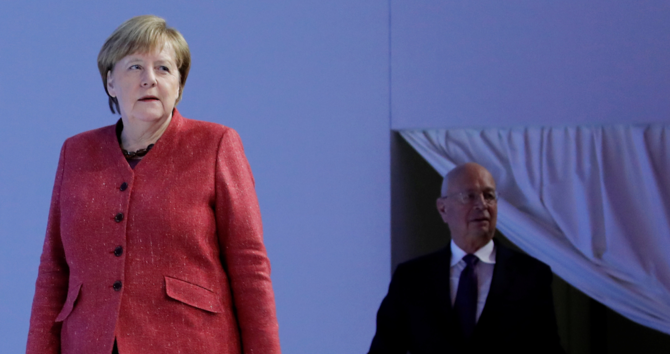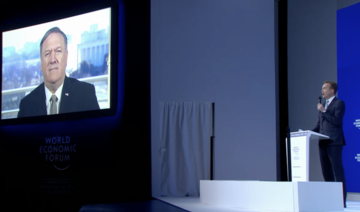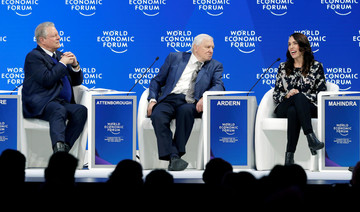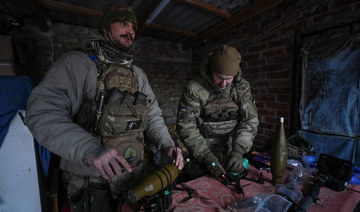DAVOS: The second day of panels and addresses is taking place in Davos, Switzerland on Wednesday. Follow Arab News' live coverage below...
17:45 - If you want an alternative view of the comings and goings at Davos, you couldn't do much better than our reporter Frank Kane's 'Davos Diary' for a more tongue-in-cheek look at the World Economic Forum...
Davos Diary: From chalets to snow boots, how to master the WEF logistics
Davos Diary: An evening in the life of WEF, from Brexit to biodiversity
Davos Diary: Central Lounge — the networking hub of the universe
--------
17:10 - Missed the address by German Chancellor Angela Merkel earlier? Don't worry, you can read/watch everything she had to say by clicking here...
16:45 - Earlier on Wednesday, Giuseppe Conte dismissed fears Italy is headed for a recession, insisting that the country's economic growth could climb as much as 1.5 percent and said there was no need for a budget adjustment to meet targets. He was speaking to Bloomberg on the sidelines of Davos.

16:30 - Italian prime minister Giuseppe Conte is speaking now on stage. Follow live below:
15:30 - A fascinating conversation on mental health and the discussions now happening around the world and what is being done to help those suffering...
#LIVE: #NewZealand PM Ardern praises impact of such a prominent international figure such as #PrinceWilliam opening up about #MentalHealth - "cannot underestimate how important that has been" #WEF19 #Davos2019https://t.co/X9cP7CcRC4 pic.twitter.com/kz9nPgtwej
— Arab News (@arabnews) January 23, 2019
#LIVE: Bernard J. Tyson (far right), chairman and CEO of #KaiserPermanente asks audience to raise hands if they have been/or know someone affected by #MentalHealth - almost all do so... #WEF19 #Davos2019 (@wef)https://t.co/X9cP7CcRC4 pic.twitter.com/wETa7HqYXA
— Arab News (@arabnews) January 23, 2019
#LIVE: #NewZealand PM Ardern speaks about the personal impact #MentalHealth has had, and gives heartbreaking stats about #suicide rate in her country - says the issue is very important to her #WEF19 #Davos2019 (@wef)https://t.co/X9cP7CcRC4 pic.twitter.com/v1UuIJved7
— Arab News (@arabnews) January 23, 2019
#LIVE: Dixon Chibanda of African #MentalHealth Research Initiative is one of just 12 psychiatrists in #Zimbabwe - a country of 16 million people. #WEF19 #Davos2019https://t.co/X9cP7CcRC4 pic.twitter.com/QWDqrYsf2g
— Arab News (@arabnews) January 23, 2019
#LIVE: @HSBC CEO John Flint talks about his company's approach to the discussion of #MentalHealth #WEF19 - watch the panel in our #Davos Day 2 live blog: https://t.co/X9cP7CcRC4 pic.twitter.com/gDe2Egyt2P
— Arab News (@arabnews) January 23, 2019
15:10 - Prince William says he found that one thing linked all the different charitable causes he had worked on - mental health. Speaks about how breaking down barriers and removing the stigma was key to what he wanted to achieve...
#LIVE: #PrinceWilliam, Duke of Cambridge and #NewZealand PM Jacinda Ardern join panel discussing mental health - 1 in 4 people will experience mental illness in their lives, costing the global economy an estimated $6 trillion by 2030 #WEF19 #MentalHealthhttps://t.co/X9cP7CcRC4 pic.twitter.com/hNoNICtu4t
— Arab News (@arabnews) January 23, 2019
15:00 - Prince William, Duke of Cambridge and New Zealand prime minister Jacinda Ardern join a panel discussing mental health - one in four people will experience mental illness in their lives, costing the global economy an estimated $6 trillion by 2030. What can the global community do to promote mental health across all facets of society? Find out by watching the panel live below:
14:30 - Wang Qishan has proven to be a bit spiky with some of his answers to Klaus Schwab's questioning during this panel, and has made some very odd references. He even manages a sly dig at European economies and corruption throughout history via Charles Dickens' Tale of Two Cities - slightly awkward, if compelling, viewing...
#LIVE: #China VP Wang Qishang referencing demons, devils, police and thieves to explain markets - gets philosophical (and has dig at #Europe) quoting Charles Dickens' Tale of Two Cities. Awkward, but very compelling viewing here at @wef #WEF19 #Davos2019https://t.co/X9cP7CcRC4 pic.twitter.com/34Vpx72xsj
— Arab News (@arabnews) January 23, 2019
#LIVE: VP Wang Qishan on #US-#China relations: Both economies are mutually indispensable, both need each other. This is a "basic judgement"... Klaus Schwab pushes him further and mentions #Pompeo's optimism #WEF19 (@wef) #Davos2019https://t.co/X9cP7CcRC4 pic.twitter.com/Z9H1sFPkwA
— Arab News (@arabnews) January 23, 2019
#LIVE: #China VP Wang Qishan: Will be a lot of uncertainties in 2019, but don't agree there is definitely going to be a crisis - China's economy will continue to achieve sustainable growth (@wef) #WEF19 #Davos2019https://t.co/X9cP7CcRC4 pic.twitter.com/UVQC0UU7JJ
— Arab News (@arabnews) January 23, 2019
14:15 - We now have a special address by Wang Qishan, the Vice-President of China. Watch his address and comments below:
13:55 - Merkel departs the stage, staying tight-lipped about her future after politics and when told she is welcome back at Davos anytime, she quips: "Well, you have me today - be grateful for what you have." Fiesty...
#LIVE: @wef #Merkel on #Brexit - #EU must get over shock of #UK leaving, and make sure the exit is "well-ordered". Wants #Germany to maintain relationship with #Britain, on which it is “absolutely dependent” in area like defense #WEF19 #Davos2019https://t.co/X9cP7CcRC4 pic.twitter.com/LZmxnTQ9LF
— Arab News (@arabnews) January 23, 2019
13:30 - Angela Merkel has defended global institutions set up in the aftermath of World War II, saying they have made the world a better place - and says the current global system will only be maintained if political compromises are made. She also says confidence in global financial systems has been shaken and must be restored.
"For a long time emerging countries like China and India influenced the world economy in a very strong way and when an existing system takes too long to react the consequences are that others (countries) make themselves noticeable through new institutions."
#LIVE: #Germany's chancellor Angela #Merkel at @wef - "Global architecture will only work if we are ready to make compromises" #WEF19 #Davos2019 #Davoshttps://t.co/X9cP7CcRC4 pic.twitter.com/SJOftGAFqW
— Arab News (@arabnews) January 23, 2019
#LIVE: #Germany's chancellor Angela #Merkel at @wef - Confidence in the global financial system has been "shaken," we must address this #WEF19 #Davos2019 #Davoshttps://t.co/X9cP7CcRC4 pic.twitter.com/Z7FnM3D7tg
— Arab News (@arabnews) January 23, 2019
#LIVE: @wef Angela #Merkel sticks up for the post-WWII global order and its institutions like the #IMF, which have "made the world a better place" #WEF19 #Davos #Davos2019 #Germanyhttps://t.co/X9cP7CcRC4 pic.twitter.com/7Yngj3FTca
— Arab News (@arabnews) January 23, 2019
13:15 - Germany's Chancellor Angela Merkel takes to the stage, watch her special address below...
--------
13:05: Meanwhile, now time for some Saudi Arabia-focused Davos news - according to Kirill Dmitriev, boss of Russia’s sovereign wealth fund, a quarter of Saudi Arabia’s pledged $10 billion investment in Russia has been deployed, he said on Wednesday. The Saudi Public Investment Fund (PIF) in 2015 signed an agreement to invest up to $10 billion in Russia through a partnership with the Russian Direct Investment Fund (RDIF).
READ MORE: Davos 2019: Saudi investment in Russia ‘hits $2.5bn’

--------
12:50 - Ethiopia's PM Abiy Ahmed is discussing the rapid transformation the country has gone through in such a short space of time, something the panel host says leaders in Europe could learn from. Talking about the wider, regional influence Ethiopa could have, he quotes: "If you want to go first, go alone. If you want to go far, go together."
#LIVE: @wef conversation with #Ethiopia PM Abiy Ahmed: "Ethiopia is seat of #AfricanUnion so it must lead by example. Regional integration is not just an economic project but crucial in securing peace in the horn of Africa #WEF19 #Davos2019https://t.co/X9cP7CcRC4 pic.twitter.com/DYHu1zt3II
— Arab News (@arabnews) January 23, 2019
#LIVE: @wef conversation with #Ethiopia PM Abiy Ahmed: "We are going to make it easy for the world to invest in our country" #Investment #Africa #WEF19 #Davos2019https://t.co/X9cP7CcRC4 pic.twitter.com/MGGrvTtTyr
— Arab News (@arabnews) January 23, 2019
12:30 - Change of pace now, as we go over to a conversation with newly appointed Ethiopian Prime Minister Abiy Ahmed, who is talking about the country's rapid pace of reform and what will be needed to realize Ethiopia's potential. Watch live below:
12:15 - Jack Ma has just spoken about the potential of Africa - he says he can sense a fear of future in Europe, but not so in Africa (or China) where there is a great optimism for the future. He says Africa, and developing countries, need the 'Four Es' in order to suceed - "entrepreneurs, education, e-frastructure (internet access) and e-government."
"Africans want change, the continent has many smart young people. Europeans always wants to keep yesterday. When you worry about the future, you will never be an entrepreneur."
#LIVE: @AlibabaGroup's Jack Ma on Africa's potential: Visit to continent changed his perceptions of continent "#Europe worries about tomorrow, #Africa doesn't worry" Africa wants change, lack of infrastructure means opportunity #WEF19 #Davos2019 (@wef)https://t.co/X9cP7CcRC4 pic.twitter.com/BkDoNDGtHF
— Arab News (@arabnews) January 23, 2019
12:00 - Alibaba founder Jack Ma is speaking to young people, technology experts and Global Shapers - the first question he is posed regards whether or not he ever had doubts whether his company would be a success. He says he definitely had fears and doubts, but he says he was completely "transparent" about that with his team and that helped build trust with the group that would make it a success. Watch it live here:
11:45 - As pretty as Davos looks in the previous update, it appears the reality is much like anywhere else in the world - traffic on the morning commute, as our reporter Frank Kane discovered...
The morning commute @wef @Davos pic.twitter.com/Djw5fvDMpO
— frank kane (@frankkanedubai) January 23, 2019
11:30 - So much of the action in Davos happens indoors, and we rarely see outside the conference center - but what is the Swiss resort actually like? We've assembled a small collection of images for you, so you can see. Rather pretty, really...(All images: AFP)



11:15 - So what do we have coming up for you today? Shortly, Abiy Ahmed, Prime Minister of Ethiopia, will be making a special address. Then we will have German Chancellor Angela Merkel on stage. She will be talking about growing uncertainty in Europe over the impending Brexit after British lawmakers last week voted down Prime Minister Theresa May's deal with the European Union. Will Britain crash out of the bloc without a deal or will it end up extending its date of departurefrom the current March 29?
The trade conflict between the US and China will also be in focus when China's vice president, Wang Qishan, addresses the conference later. On Tuesday, Mike Pompeo said he was "optimistic" that there will be a "good outcome" in upcoming trade discussions with China in Washington. A high-level Chinese delegation is due to arrive in the US capital on Jan. 30 as the two sides seek to strike an accord to end their trade conflict.
READ MORE: Mideast CEOs turn gloomy on global economy, PwC study finds
--------
10:35 - Shinzo Abe has delivered an engaging and interesting address (not something you can say about everyone at the forum...) and this line about tackling Climate Change being a potentially profitable, rather than costly, exercise stood out...
#LIVE: Great line from #Japan's Shinzo Abe on #ClimateChange and dealing with it being potentially profitable at @wef - "Spending money on a green earth and a blue ocean - once deemed costly - is now a growth generator" #WEF19 #Davos2019https://t.co/X9cP7CcRC4 pic.twitter.com/FSQcFxsl8E
— Arab News (@arabnews) January 23, 2019
10:20 - Shinzo Abe's address is all about his policies that have helped raise wages in Japan, put two million women into work and helping the notoriously elderly population transition into an evolving workforce. The fact he is addressing Davos in English is also particularly impressive - a sign of his hopes to open up Japan to the world a bit more?
#LIVE: #Japan's Shinzo Abe highlights his policies helping 2 million Japanese women into the workforce, and tackling the "ageing population" problem faced in previous years. Hear his full address on our live blog: https://t.co/X9cP7CcRC4 #WEF19 #Davos19 (@wef) pic.twitter.com/US3F6hkvbu
— Arab News (@arabnews) January 23, 2019
10:15 - Japanese prime minister Shinzo Abe begins his address to the forum...
10:00 - Haifaa Al-Mansour, the first female filmmaker in Saudi Arabia and a winner at this year's WEF Crystal Awards, was speaking this morning. The acclaimed director spoke about her dedication to breaking boundaries and shaping new stories, at a panel entitled “An Insight, An Idea with Haifaa Al-Mansour.”
You can watch a recap of her discussion here
LIVE: #Saudi film director @HaifaaMansour at #wef19: Women in the west should collaborate more with women in the east to create something universal
@wef https://t.co/180Q2H0Qcg pic.twitter.com/JeESjjGq6U
— Arab News (@arabnews) January 23, 2019
-------
09:45 - Another bit of news from the first day was the meeting between Dubai's crown prince Sheikh Hamdan and WEF founder Klaus Schwab, you can read about their meeting here...

09:30 - More senior world leaders will take to the stage today, with the Japanese prime minister, the German chancellor and the prime minister of Ethiopia all on the agenda. Stay tuned to keep track of all Wednesday's action.
One of the highlights of the first day was the story and impassioned plea of refugee Mohammed Hassan Mohamud - a Somalian displaced person currently in a camp in Kenya.
"I've spent the last 20 years of my life in a camp, and I will go back there next week."
Listen to more of Mohammed's inspiring story here: https://t.co/c1JxqQRMoO #wef19 pic.twitter.com/s2UajbNAk2
— World Economic Forum (@wef) January 23, 2019

























